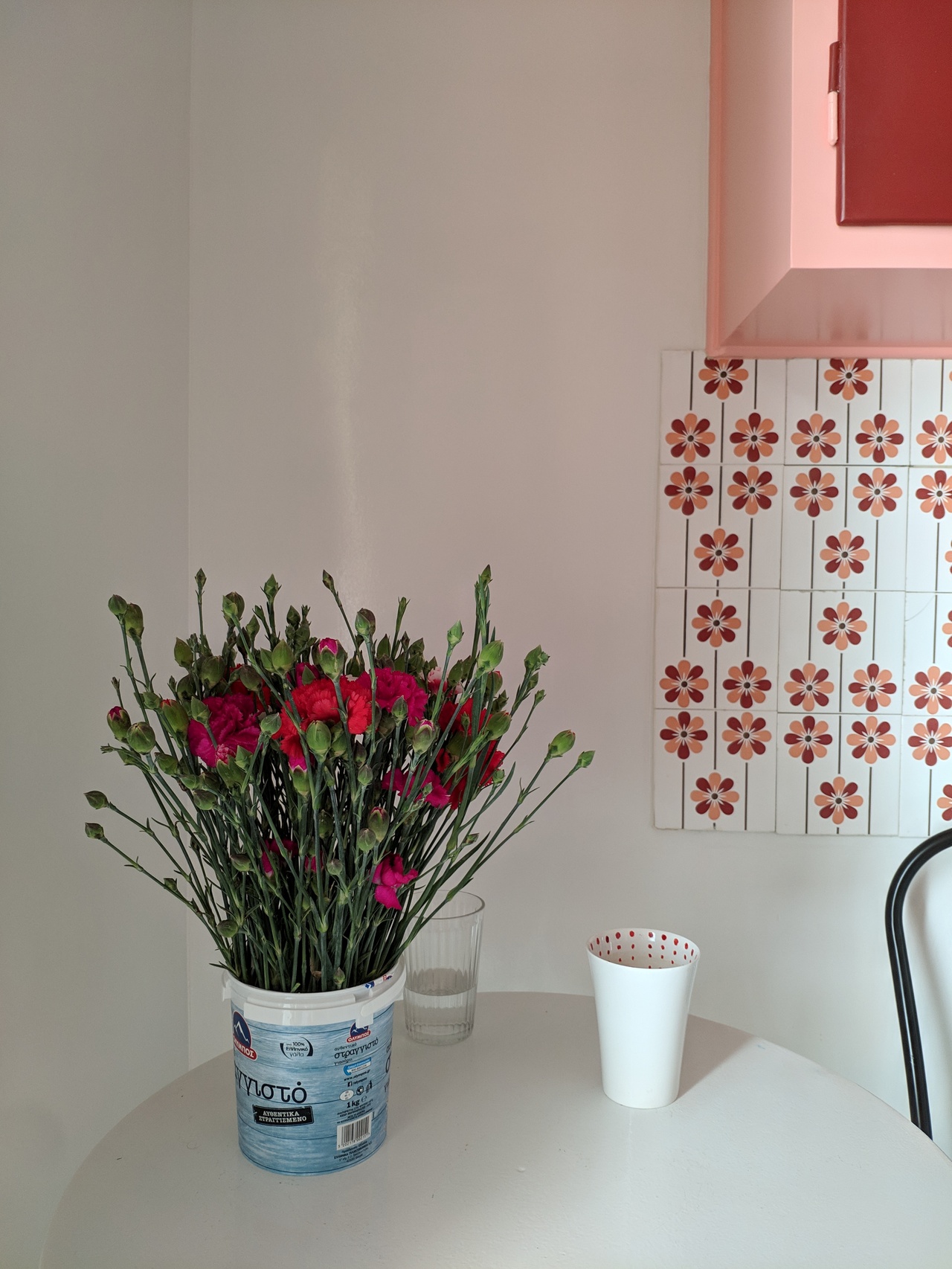Curving the Flat, Distancing the Social: Side Effects without Remuneration by Sofia Bempeza

Kitchen Stories: Lockdown in Athens, May 1st
Following the lockdown restrictions, as imposed in Greece on March 23rd, people spent several weeks in self-isolation without friends, with or without flatmates, with and around families, or alone. The common goal was flattening the curve for preventing the healthcare system from being overwhelmed; after all, there are about 600 intensive care units operable in the country. We were forced to stay home, expected to be self-sustainable, and take care of others in need. We were asked to stay productive, creative, and patient. So, we did – or actually we didn’t. Social distancing has its price, most notably if we imagine the hierarchies of the social. The quarantine suspends most activities, transforms the existing ones, or creates specific ones for ensuring life and work in the lockdowns. Day by day my flat was curving, the corners were bending, and the actual mirrors became distorting mirrors, like the computer’s glass surface, the window glass or the mobile phone. Self-isolation under COVID-19 is a strange, alienating, and uncanny experience. Whether one actually managed (more or less) to keep to this forced but necessary domestic bubble, it is alluring how social and political issues became more striking. As well as dreams, necessities and priorities within the pandemic acceleration became palpable in a different manner.
Among the many facets of the pandemic crisis in Greece I have in mind, this lockdown is associated with education, care, and social economies. Schooling and educating cannot be reduced to talking heads transmitting optimal skills through digital infrastructure. [1] Home is not necessarily a safe space for everybody, not a shelter full of comforts that allegedly one couldn’t appreciate before COVID-19. The quarantine brought a rise in gender-based violence, [2] as it also reinforced the notions of bordering and mobility, the latter experienced either as privilege or as structural exclusion. Social distancing has become the mantra for all citizens, for the politics of immunization are being tested nationwide. But as for the refugees trapped under European migration policies, there is only abandonment and/or police brutality left. [3] This pandemic strikes because it brings up the notion of collective and individual vulnerability: it reveals the (in)sufficiency of health and maintenance systems, it ruins the grand narrative of globalization. There is nothing wrong in taking care of ourselves and vulnerable others. The coronavirus pandemic urges to reevaluate not only the politics of reproductive labor and care [4] but also the international division of labor [5] and the consequences of social inequality.
“Apologies for the inconvenience. But you are too many and there is no time for personal communication.” This is the beginning of a text message sent by Swissport and Skyserv airport handling services to approximately 300 fixed-term employees announcing their dismissal due to reduction of business activities at the Athens airport. [6] According to the current legislative acts, as imposed by the Greek government in response to the coronavirus pandemic, companies and major corporations can reduce parts of their staff by implementing special termination conditions under contentious employment laws that neglect labor rights. As a result, a significant number of employees, as the aforementioned, are exempted from the coronavirus support allowance. The same goes for thousands of cultural producers (artists, technicians, educators, etc.) working in theater, dance, cinema, music, and the fine arts, who found themselves not included in the lists for the state support allowance.

Mother’s walls: Temporary Night Setting
It may sound strange, but the Ministry of Culture and Sports didn’t announce any support measures for cultural producers living and working in Greece till the beginning of May, whereas cultural activities had in fact been gravely reduced in the weeks before the official lockdown. At the end of April numerous individual artists and cultural producers, art groups, cultural organizations, and associations organized social media rallies and protests to put pressure on the right-wing government. Initiatives like Support Art Workers and Cultural Workers Alliance Greece are urging the Ministry of Culture to acknowledge the structural precariousness within the cultural sector (short-term contracts, non-registered labor, unpaid labor, lack of social insurance, hidden economies) and to face the economic consequences of the pandemic for the vast majority of art and cultural workers. Art and cultural workers’ initiatives demand not just a realistic emergency plan, but rather a large-scale policy for the arts and culture. [7]
The response by the Ministry of Culture and Sports promised the state allowance retroactively for two months under specific criteria that actually respond only to certain working profiles and contracts. Furthermore, it became clear that only those artists/cultural workers who fit the market criteria of the ‘creative entrepreneur’ can receive the allowance, whereas those most precarious and economically weak are not being supported. The actual plan for supporting art and cultural workers is an amalgam of fast-track implementations (mostly towards digital formats and future productions) characterized through tactical blindness towards all different types of labor within the cultural sector. Besides, state representatives lack specific knowledge of the field (for example, of contemporary art practices). What is particularly striking, however, is that the ministry advocates that artists and cultural producers be directed toward unspecific social work or unemployment programs under an uncertain social security system. Ineffective in handling the current situation, the announced plan divides state grants in an arbitrary manner, intensifying social division among cultural workers while at the same time leaving terrain to major private institutions for boosting culture and neoliberal creativity on their terms. Art workers and cultural producers based in Greece, despite the distinct economic and social backgrounds among art professionals, seem to oscillate between Scylla and Charybdis, in other words, between the structural inconsistency of public cultural policies on the one hand and the growing dependency on sparse private cultural institutions on the other.
It is certain that the global capitalist economy will get new wheels and wings to overcome the disruption occurring under the pandemic. But going back to so-called normality or to business as usual can be neither a feasible solution nor an auspicious vision for art and cultural producers. The efforts to disassociate from hegemonic power processes as well as social struggles may differ from place to place, though the history of organized art labor rings a bell: “Until such time as minimum income is guaranteed for all people, the economic position of artists should be improved in the following ways: (…)”. [8] The Art Workers’ Coalition and their allies in the social movements may have envisaged basic income in the 1960s as part of their set of demands. Nowadays the demands for a (universal) basic income rise up strongly throughout Europe and beyond.
The pandemic crisis is the amplifier. We already know that the phony promise of self-fulfillment under precariousness and neoliberalism has reached an impasse: after a decade embroiled in debt crisis, after years of recession and social segregation, after the latest months in a state of economic and social uncertainty (not only for cultural workers). While still in the process of experiencing the consequences of the pandemic crisis, we must continue exercising in theory and practice actions that tackle inequality and injustice. Still the question remains: In which terms do we envisage art and cultural production beyond the pandemic?
Sofia Bempeza is an artist and art/cultural theorist, author of the book Geschichte(n) des Kunststreiks, transversal 2019.
Notes
| [1] | The current impact of distance learning is reinforcing social inequalities among students, educators, and parents. |
| [2] | As in many countries, the quarantine has exacerbated domestic violence in Greece, as a recent survey conducted by the General Secretariat for Family Policy and Gender Equality reveals. (Press release (Greek only) from May 5, 2020 available at the secretariat website http://www.isotita.gr.) |
| [3] | Bilgin Ayata and Artemis Fyssa, “Politics of Abandonment: Refugees on Greek Islands during the Coronavirus Crisis,” Eurozine, April 4, 2020, https://www.eurozine.com/politics-of-abandonment. See also the Border Violence Monitoring Network at https://www.borderviolence.eu/violence-reports. |
| [4] | See Plan C, “Building a Feminist Response to the Pandemic," Plan C, April 5, 2020, https://www.weareplanc.org/blog/building-a-feminist-response-to-the-pandemic, Asian American Feminist Collective & Bluestockings NYC Collab, Asian American Feminist Antibodies: Care in the Time of Coronavirus, March 2020, AAFCZine3_CareintheTimeofCoronavirus.pdf . |
| [5] | Maddalena Manca, “My Fight As a Worker and As a Feminist during COVID-19,” Spectre, April 28, 2020, https://spectrejournal.com/my-fight-as-a-worker-and-as-a-feminist-during-covid-19. |
| [6] | At the end of March 2020, the Athenian Labor Center and the unions reported the dismissal of fixed-term employees, some of them having worked under continuous renewals of their monthly contracts for almost a decade. See http://www.economy365.gr/article/138996/swissport-iellas-sms-ton-300-apolyseon-eiste-polloi-den-yparhei-hronos-prosopikis (Greek only). |
| [7] | See, for instance, the open letter to the Minister of Culture and Sports, Minister of Employment and Social Matters, and the Secretary General for Contemporary Culture, signed by Cultural Workers Alliance Greece and supporters, https://docs.google.com/forms/d/e/1FAIpQLSek0rH_y0tejrBDry-zGWuXp5ZscZF7PjYjBpVkBg3lUbRebA/viewform. |
| [8] | From the Art Workers’ Coalition, Set of Demands 1969/1970, to apply to all museums. Published in: Lucy Lippard, “The Art Workers’ Coalition: Not a History,” Studio International (November 1970), pp. 10–19. |
